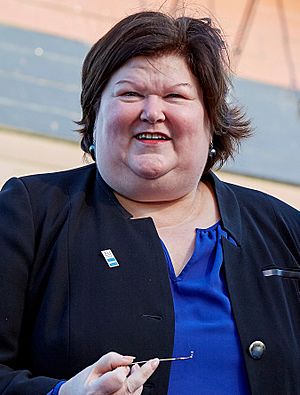Maggie De Block facts for kids
Quick facts for kids
Maggie De Block
|
|
|---|---|
 |
|
| Minister of Health and Social Affairs | |
| In office 11 October 2014 – 1 October 2020 |
|
| Prime Minister | Charles Michel Sophie Wilmès |
| Preceded by | Laurette Onkelinx |
| Succeeded by | Frank Vandenbroucke |
| Minister of Justice | |
| In office 25 July 2014 – 11 October 2014 |
|
| Prime Minister | Elio Di Rupo |
| Preceded by | Annemie Turtelboom |
| Succeeded by | Koen Geens |
| State Secretary of Asylum, Migration, Social Integration, and Poverty Reduction | |
| In office 6 December 2011 – 11 October 2014 |
|
| Prime Minister | Elio Di Rupo |
| Preceded by | Melchior Wathelet (Asylum and Migration) Philippe Courard (Social Integration and Poverty Reduction) |
| Succeeded by | Theo Francken (Asylum, Migration, and Reduction of Administrative Burden) Elke Sleurs (Poverty Reduction, Fraud Combat, and Science Policy) |
| Minister of Asylum and Migration | |
| In office 9 December 2018 – 1 October 2020 |
|
| Prime Minister | Charles Michel Sophie Wilmès |
| Preceded by | Theo Francken (As State Secretary of Asylum, Migration, and Reduction of Administrative Burden) |
| Personal details | |
| Born | 28 April 1962 Merchtem, Belgium |
| Political party | Open VLD (2007–present) VLD (1999–2007) |
| Alma mater | Vrije Universiteit Brussel |
Maggie Celine Louise De Block (born 28 April 1962) is a Belgian politician and a member of the Open VLD political party. She is known for serving in several important government roles, including as the Minister of Health and Social Affairs. A minister is a politician in charge of a specific government department.
Since 2020, she has been a leader for her party's group in the Chamber of Representatives, which is part of Belgium's parliament. From 2014 to 2020, she was in charge of the country's health policies under Prime Ministers Charles Michel and Sophie Wilmès.
Contents
Early Life and Education
Maggie De Block was born in Merchtem, Belgium, on April 28, 1962. She was the oldest of three children. Her father, Jan De Block, worked for Belgium's national railway company. Sadly, her father died in a car accident when she was seven years old.
After high school, Maggie studied medicine at the Vrije Universiteit Brussel. While she was still a student, she married Luc Asselman in 1982, and they have two children. After finishing her studies, she became a family doctor.
Political Career
Entering Politics
In 1999, De Block decided to enter politics. She ran for a position in the federal election with the liberal party, VLD. She was elected as a member of the Belgian Chamber of Representatives, one of the two parts of the country's parliament.
In 2011, she took on a new role as the Secretary of State for Asylum, Immigration, and Social Integration. A Secretary of State is a government official who helps a minister with their duties. In 2012, she became the vice-chair of her political party, the Open VLD. For a short time in 2014, she also served as the Minister of Justice.
Minister of Health (2014–2020)
In October 2014, De Block became the Minister of Social Affairs and Health. She said this job was her "dream." Some people commented on her weight, saying she was not the right example for a health minister. She responded by saying, "I know I'm not a model but you have to see what's inside, not the packaging."
During her time as minister, she helped organize Belgium's response to the Ebola virus epidemic in West Africa. In 2015, she worked with the Netherlands to buy medicines for people with rare diseases. That same year, polls showed she was the most popular politician in all of Belgium.
In 2018, De Block decided that all tobacco products in Belgium should be sold in plain packaging. This means the packages have no logos or branding, which is meant to discourage smoking.
Handling the COVID-19 Pandemic
In 2018, a stock of protective FFP2 masks was destroyed because they were past their use-by date and were not replaced. This decision was later criticized during the COVID-19 pandemic in 2020, when there was a shortage of masks.
As the Minister of Health, De Block was in charge of the government's early response to the pandemic. She asked other countries in the European Union to work together to share protective masks. By July 2020, she expressed concern that there was not enough teamwork between Belgium and its neighbors like France, Germany, and the Netherlands.
After a new government was formed in late 2020, De Block was not chosen for a minister position again. She returned to her role as a member of the Belgian Parliament.
Other Work
In 2020, the World Health Organization (WHO) asked De Block to join two important groups. One is the Pan-European Commission on Health and Sustainable Development. The other is the Global Leaders Group on Antimicrobial Resistance, which works to solve problems related to germs that no longer respond to medicine.
Honours
 Belgium: Commander in the Order of Leopold II
Belgium: Commander in the Order of Leopold II
 | John T. Biggers |
 | Thomas Blackshear |
 | Mark Bradford |
 | Beverly Buchanan |

